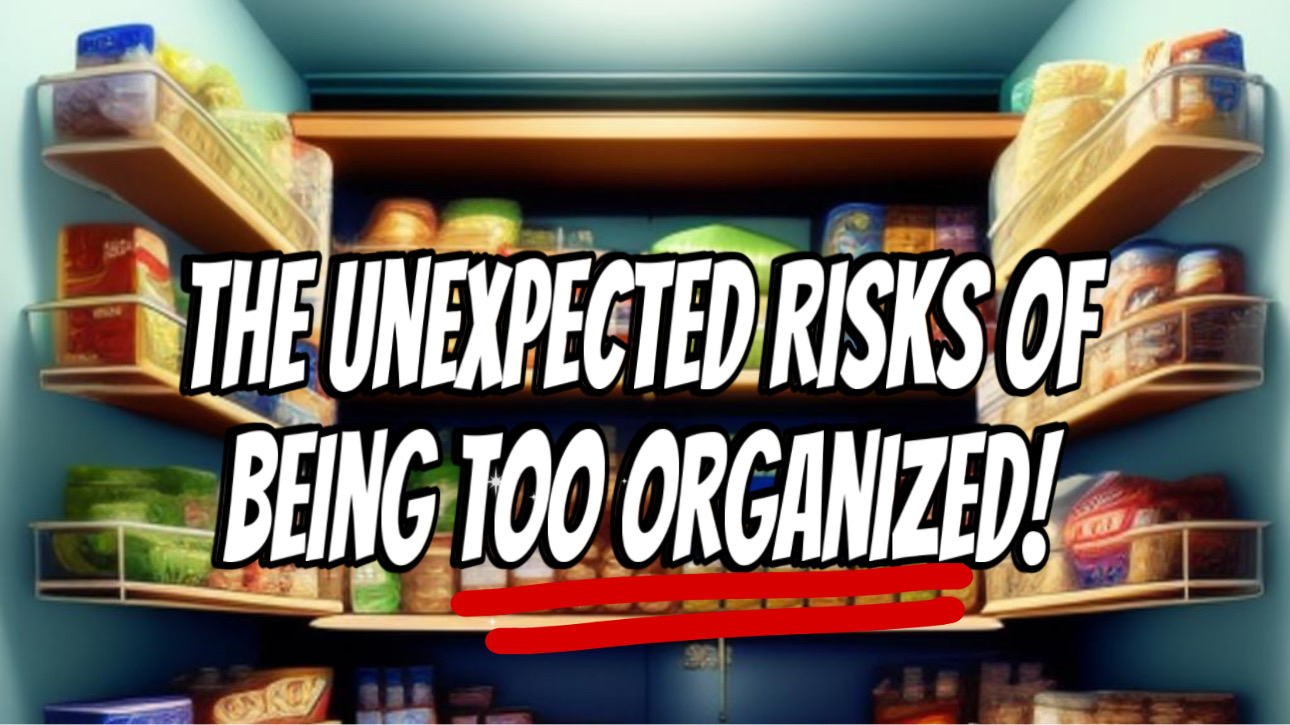No products in the cart.
Return To ShopThe Unexpected Risks of Being Too Organized
No feed items found.
<h2>1. Introduction: The allure of being organized</h2>
Organizing our lives and surroundings has become a sought-after goal in today’s fast-paced and chaotic world. From color-coded calendars to meticulously labeled storage bins, the appeal of being organized is undeniable. It promises a sense of control, efficiency, and productivity. However, beneath the surface of this seemingly perfect picture lies a darker side. The obsession with excessive organization can lead to unexpected risks and consequences that are often overlooked. In this article, we will delve into the hidden downsides of being too organized, exploring its impact on mental health, relationships, flexibility, creativity, and ultimately, the importance of finding a balance between order and spontaneity.
<h2>1. Introduction: The allure of being organized</h2>
<h3>The benefits of organization</h3>
Ah, organization. The very word conjures images of color-coded calendars, neatly arranged closets, and perfectly alphabetized bookshelves. It’s a tantalizing concept, promising an easier, more efficient life. And indeed, there are undeniable benefits to being organized. It can save time, reduce stress, and increase productivity. Who wouldn’t want that?
<h3>The societal pressure for organization</h3>
But it’s not just the personal advantages that make organization so alluring. Society itself seems to place a premium on being organized. From the countless articles about decluttering to the popularity of home improvement shows featuring immaculate spaces, there is a societal expectation that we should all have our lives together. It’s as if being disorganized is a cardinal sin, punishable by eternal chaos.

For the time being, theses papers are organized neatly.
<h2>2. The hidden downsides of excessive organization</h2>
<h3>The obsession with perfection</h3>
However, there’s a dark side to excessive organization that often goes unnoticed. It’s the insidious obsession with perfection that can accompany a highly organized lifestyle. Suddenly, the pursuit of order turns into a relentless quest for flawlessness. Every angle must be right, every label pristine. The pressure to meet impossibly high standards can feel overwhelming and lead to a never-ending cycle of self-criticism.
<h3>The constant need for control</h3>
Another hidden downside of excessive organization is the constant need for control. When every aspect of your life is meticulously planned and micro-managed, it can breed a sense of anxiety. Any deviation from the carefully orchestrated routine is seen as a threat, and the fear of losing control becomes all-consuming. The freedom to go with the flow and embrace spontaneity is sacrificed at the altar of organization.
<h2>3. Mental health implications: Anxiety and perfectionism</h2>
<h3>The relationship between excessive organization and anxiety</h3>
Unsurprisingly, excessive organization can take a toll on mental health. The rigid structure and high expectations can trigger anxiety, leaving little room for relaxation or spontaneity. The constant pressure to maintain order and control can create a constant state of tension, making it difficult to find peace of mind.

<h3>The negative impact of perfectionism on mental well-being</h3>
Furthermore, the perfectionism that often accompanies excessive organization has its own set of consequences. The pursuit of flawlessness can lead to self-criticism, feelings of inadequacy, and a never-ending cycle of dissatisfaction. The constant comparison to an unattainable ideal can erode self-esteem and undermine mental well-being.
<h2>4. Impact on flexibility and adaptability</h2>
<h3>The rigidity of excessive organization</h3>
Beyond the mental health implications, excessive organization can also hinder our ability to adapt and be flexible. When everything is planned to the minute detail, there is little room for spontaneity or the unexpected. Life’s curveballs become sources of stress rather than opportunities for growth. The rigidity of an overly organized life can limit our ability to embrace change and learn from new experiences.
<h3>The difficulty in adapting to unexpected changes</h3>
Moreover, being too organized can make it challenging to deal with unexpected changes. When you’re accustomed to everything going according to plan, disruptions can feel like major setbacks. It becomes difficult to think on your feet and adapt to new circumstances. Instead of being able to roll with the punches, you find yourself stuck, unable to navigate the uncharted territories of the unplanned.
So, while organization certainly has its benefits, it’s essential to strike a balance. Embrace the chaos a little, allow yourself to embrace imperfections, and be open to the unexpected. After all, the best adventures in life often come from veering off the beaten path, not sticking rigidly to the itinerary.<h2>5. Strained relationships and social isolation</h2>
<h3>The impact of excessive organization on personal relationships. The unexpected risks of being to Organized are… </h3>
Being too organized may seem like a good thing, but it can actually put a strain on your personal relationships. When you’re constantly focused on keeping everything in order, you might unintentionally neglect the people in your life. Your loved ones could feel like they come second to your color-coded to-do list, and that can lead to feelings of resentment and distance.
<h3>The isolation that can result from rigid routines</h3>
In your quest for organization, it’s easy to fall into rigid routines that leave little room for spontaneity. While structure can be helpful, too much of it can lead to isolation. In a highly organized life, there’s often little time for socializing or embracing new experiences. You might find yourself missing out on opportunities to connect with others and form meaningful relationships.

See, chaos can be beautiful.
<h2>6. Lost opportunities for creativity and spontaneity</h2>
<h3>The stifling effect of excessive organization on creativity</h3>
Being too organized can put a damper on your creative spirit. When everything is meticulously planned and scheduled, there’s little room for inspiration to strike. Creativity thrives in the realm of chaos and spontaneity, but excessive organization can squash those sparks of originality. So, if you find yourself trapped in a perfectly organized box, don’t be surprised if your creative mojo goes missing.
<h3>The lack of spontaneity and novelty in a highly organized life</h3>
Life becomes predictable when it’s overly organized. When every minute is planned and accounted for, there’s no room for surprises or spontaneous adventures. It’s like watching the same movie over and over again – it gets boring. So, while you may be crossing off tasks left and right, you might also be missing out on the joy of the unexpected. Life’s most memorable moments often happen when we least expect them.
<h2>7. The importance of finding balance: Embracing imperfection</h2>
<h3>The benefits of a more flexible approach to organization</h3>
Finding a healthy balance between organization and flexibility can do wonders for your well-being. Being open to adjusting your plans and embracing imperfections allows for adaptability and reduces stress. It gives you the freedom to prioritize what truly matters and make room for spontaneity and relaxation. Remember, life isn’t a to-do list; it’s a beautiful, messy, and ever-changing journey.
<h3>Finding a healthy middle ground between organization and chaos</h3>
Striking a balance between organization and chaos doesn’t mean you have to abandon your organized habits completely. It’s about finding a middle ground that works for you. Allow yourself some flexibility in your routines and give yourself permission to deviate from the plan occasionally. By doing so, you create space for personal growth, deeper connections, and unexpected joys.
<h2>8. Conclusion: Embracing a more flexible approach to organization</h2>
<h3>The value of embracing imperfection and spontaneity</h3>
By embracing imperfection and welcoming spontaneity into your life, you’ll find a newfound sense of freedom and joy. It’s the imperfections that make life interesting and memorable. So, don’t be afraid to let go of excessive organization and embrace the beautiful messiness of life.
<h3>Strategies for achieving a balanced and adaptable lifestyle</h3>
To achieve a balanced and adaptable lifestyle, start by reevaluating your priorities. Focus on what truly matters to you and let go of unnecessary perfectionism. Embrace flexibility in your routines and make room for spontaneity. Remember, it’s okay to color outside the lines every once in a while. Life is too short to be spent obsessing over color-coded to-do lists. So, laugh a little, go with the flow, and enjoy the unexpected twists and turns that come your way.<h2>8. Conclusion: Embracing a more flexible approach to organization</h2>
While organization undeniably offers numerous benefits, it is crucial to recognize the unexpected risks that can arise from an excessive pursuit of order. Striving for perfection and rigidly adhering to strict routines can take a toll on our mental health, flexibility, relationships, and creativity. Instead, embracing a more flexible approach to organization, one that allows for imperfections and spontaneity, can lead to a more balanced and fulfilling life. By finding the middle ground between order and chaos, we can navigate the unexpected with ease, foster creativity, and cultivate healthier relationships. So, let us embrace the beauty of imperfection and unlock the remarkable possibilities that lie beyond the confines of excessive organization.

This type of organization skills can drive someone crazy.
<h2>FAQ</h2>
<h3>1. Can being too organized really have negative consequences?</h3>
Yes, excessive organization can have unexpected risks and consequences. While organization offers benefits, such as increased productivity and efficiency, being overly focused on order and control can lead to mental health issues, strained relationships, and a lack of flexibility and creativity.
<h3>2. How does excessive organization impact mental health?</h3>
Excessive organization can contribute to anxiety and perfectionism. The constant need for control and the pressure to maintain a perfectly organized life can create immense stress, leading to heightened anxiety levels and a negative impact on overall mental well-being.
<h3>3. Can being too organized affect personal relationships?</h3>
Yes, excessive organization can strain personal relationships. Rigid routines and an obsession with order can limit spontaneity and flexibility, making it challenging to connect with others on a deeper and more meaningful level. It can also create unrealistic expectations for loved ones, leading to frustration and tension.
<h3>4. Is there a way to find a balance between organization and flexibility?</h3>
Absolutely! It’s important to find a balance that works for you. Embracing imperfection, allowing for spontaneity, and being open to adapting to unexpected changes are key steps. Incorporating flexible routines, setting realistic expectations, and giving yourself permission to let go of excessive control can help achieve a healthier and more balanced approach to organization.





Add comment